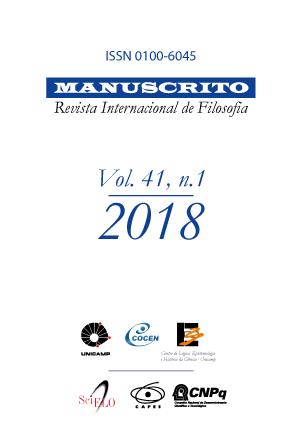Resumo
No debate acerca da singularidade de, pelos menos, alguns de nossos pensamentos sobre o mundo, assume-se corriqueiramente que o responsável pela natureza singular do episódio mental não é o próprio episódio e, sim, a proposição singular expressa quer por um proferimento assertórico de sentença singular autônoma, quer pela cláusula complementar em um relato de atribuição de atitude proposicional. As rotas semânticas padrão assumem que a singularidade do episódio mental (conceitual) é por assim dizer “herdada” da singularidade do conteúdo. Argumento que este pressuposto apresenta uma lacuna, pois desconsidera o papel desempenhado em certos atos de pensamento, chamados de episódicos, por habilidades cognitivas tais como a capacidade de perceber objetos particulares, de vivenciar (novamente) ou de projetar-se mentalmente em direção a acontecimentos particulares pessoais, diretamente responsáveis por sua singularidade. No entanto, contra a tese de que haveria capacidades episódicas aí envolvidas, argumento que a singularidade dos atos de pensar episódicos se dá pelo exercício pontual no espaço e no tempo dessas capacidades e há, portanto, um sentido não derivado em que eles podem ser qualificados como singulares.Referências
ADDIS, D. R.; WONG, A. T.; SCHACTER, D. L. “Remembering the Past and Imagining the Future: Common and Distinct Neural Substrates During Event Construction and Elaboration”. Neuropsychologia, 45 (7), pp. 1363-1377, 2007.
ALMOG, J.; PERRY, J., et al. Themes from Kaplan. New York: Oxford University Press, 1989.
ALMOG, J.; LEONARDI, P. The Philosophy of David Kaplan. New York: Oxford University Press, 2009.
ATANCE, C. M.; O'NEILL, D. K. “The Emergence of Episodic Future Thinking in Humans”. Learning and Motivation, 36, pp. 126-144, 2005.
BACH, K. Thought and Reference. Paperback Edition. Oxford, New York: Oxford University Press, 1994.
BACH, K. “Getting a Thing into a Thought”. In: R. Jeshion (ed.) (2010b), pp. 39-63.
BERG, J. Direct Belief: An Essay on the Semantics, Pragmatics, and Metaphysics of Belief. Berlin: De Gruyter, 2012.
BERMÚDEZ, J. L. Thinking Without Words. New York: Oxford University Press, 2003.
BERNECKER, S.; MICHAELIAN K. The Routledge Handbook of the Philosophy of Memory. London, New York: Routledge, 2017.
BURGE, T. Belief De Re. Journal of Philosophy, 74 (6), pp. 338-362, 1977.
BURGE, T. “Five Theses on De Re States and Attitudes”. In: J. Almog and P. Leonardi (Eds.) (2009), pp. 246-316.
CAPPELEN, H.; DEVER, J. The Inessential Indexical: On the Philosophical Insignificance of Perspective and the First Person. Oxford: Oxford University Press, 2013.
CHURCH, A. “A Formulation of the Logic of Sense and Denotation”. In: P. Henle (ed.) (1951), pp. 3-24.
CRANE, T. “I–The Singularity of Singular Thought”. Aristotelian Society Supplementary Volume, LXXXV (1), pp. 21-43, 2011.
CRANE, T. The Objects of Thought. Oxford: Oxford University Press, 2013.
DONNELLAN, K. S. “Reference and Definite Descriptions”. The Philosophical Review, 75 (3), pp. 281-304, 1966.
EVANS, G. The Varieties of Reference. J. McDowell (ed.). Oxford: Clarendon Press, 1982.
FREGE, G. “Der Gedanke. Eine logische Untersuchung”. Beiträge zur Philosophie des deutschen Idealismus, 2, pp. 58-77, 1918-19.
HAWTHORNE, J.; MANLEY, D. The Reference Book. Oxford: Oxford University Press, 2012.
HENLE, P. Structure, Method, and Meaning: Essays in Honor of Henry M. Sheffer. New York: Liberal Arts Press, 1951.
JESHION, R. “Introduction to New Essays on Singular Thought”. In: R. Jeshion (ed.) (2010), pp. 1-35.
JESHION, R. New Essays on Singular Thought. Oxford, New York: Oxford University Pressed, 2010.
KAPLAN, D. “Quantifying In”. Synthese, 19 (1-2), pp. 178-214, 1968.
KAPLAN, D. “Demonstratives: An Essay on the Semantics, Logic, Metaphysics, and Epistemology of Demonstratives and Other Indexicals”. In: J. Almog, J. Perry et al. (eds.) (1989), pp. 481-563.
KORTA, K.; PERRY, J. Critical Pragmatics: An Inquiry Into Reference and Communication. Cambridge: Cambridge University Press, 2011.
KRIPKE, S. A. Naming and Necessity. Cambridge, Mass.: Harvard University Press, 1980.
LESLIE, S.-J.; LERNER, A. “Generic Generalizations”. The Stanford Encyclopedia of Philosophy (Winter 2016 Edition), E. N. Zalta (ed.), URL= https://plato.stanford.edu/archives/win2016/entries/generics/, 2016.
MARTIN, M. G. F. “Particular Thoughts and Singular Thought”. In: A. O'Hear (ed.) (2002), pp.173-214.
MARTONE, F. “Singular Reference Without Singular Thought”. Manuscrito, 39 (1), pp. 33-59, 2016.
O'HEAR, A. Logic, Thought, and Language. Cambridge: Cambridge University Press, 2002.
PERRIN, D.; MICHAELIAN, K. “Memory as Mental Time Travel”. In: S. Bernecker and K. Michaelian (eds.) (2017), pp. 228-239.
PERRY, J. “Rip Van Winkle and Other Characters”. The European Review of Analytical Philosophy, 2: Cognitive Dynamics, pp. 13-39, 1997.
PERRY, J. Reference and Reflexivity. Stanford: Center for the Study of Language and Information, 2001.
QUINE, W. V. “Quantifiers and Propositional Attitudes”. Journal of Philosophy, 53 (5), pp. 177-187, 1956.
RECANATI, F. “Singular Thought: In Defence of Acquaintance”. In: R. Jeshion (ed.) (2010), pp.141-189.
RUSSELL, B. “On Denoting”. Mind, 14 (56), pp. 479-493, 1905.
SALMON, N. Frege's Puzzle. Cambridge, Mass: The MIT Press, 1986.
SALMON, N. “Tense and Singular Propositions”. In: J. Almog, J. Perry et al (eds.) (1989), pp. 331-392.
SALMON, N. “Three Perspectives on Quantifying In”. In: R. Jeshion (ed.) (2010), pp. 64-76.
SCHACTER, D. et al. “Episodic Future Thinking and Episodic Counterfactual Thinking: Intersections between Memory and Decisions”. Neurobiology of Learning and Memory, 117, pp. 14-21, 2015.
SCHACTER, D. L.; ADDIS, D. R.; BUCKNER, R. L. “Remembering the Past to Imagine the Future: The Prospective Brain”. Nature Reviews Neuroscience, 8 (9), pp. 657-661, 2007.
SCHIFFER, S. “The Basis of Reference”. Erkenntnis, 13 (1), pp. 171-206, 1978.
THOMPSON, M. “Singular Terms and Intuitions in Kant's Epistemology”. Review of Metaphysics, 26 (2), pp. 314-343, 1972.
TULVING, E. “Episodic and Semantic Memory”. In: E. Tulving and W. Donaldson (eds.) (1972), pp. 381-403.
TULVING, E. Elements of Episodic Memory. Oxford: Oxford University Press, 1985.
TULVING, E.; DONALDSON, W. Organization of Memory. New York: Academic Press, 1972.

